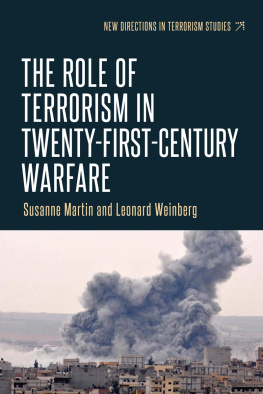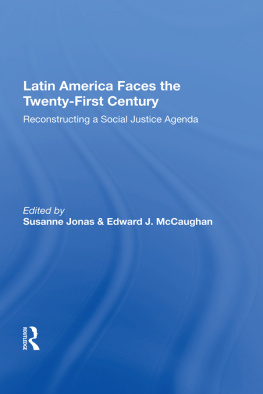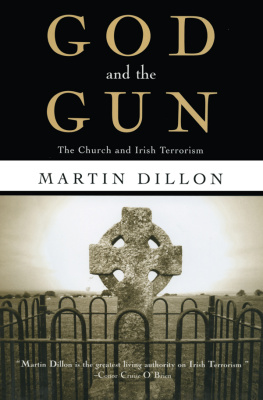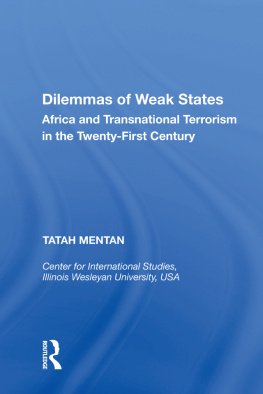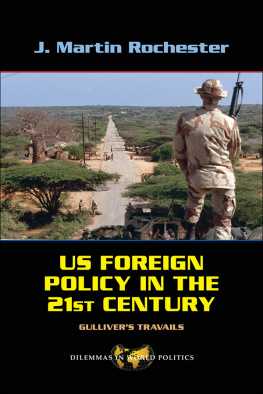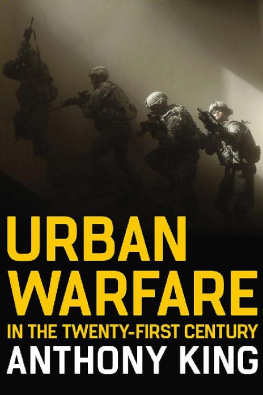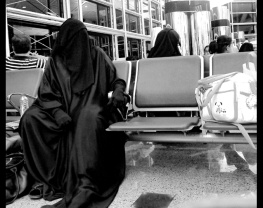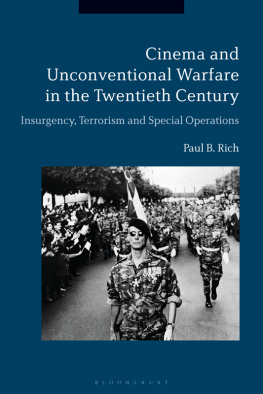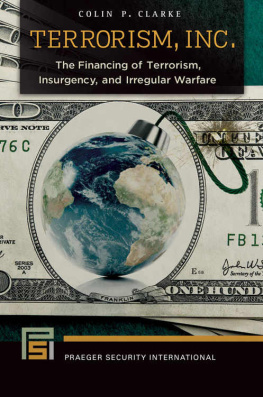Susanne Martin - The Role of Terrorism in Twenty-First-Century Warfare
Here you can read online Susanne Martin - The Role of Terrorism in Twenty-First-Century Warfare full text of the book (entire story) in english for free. Download pdf and epub, get meaning, cover and reviews about this ebook. year: 2016, publisher: Manchester University Press, genre: Politics. Description of the work, (preface) as well as reviews are available. Best literature library LitArk.com created for fans of good reading and offers a wide selection of genres:
Romance novel
Science fiction
Adventure
Detective
Science
History
Home and family
Prose
Art
Politics
Computer
Non-fiction
Religion
Business
Children
Humor
Choose a favorite category and find really read worthwhile books. Enjoy immersion in the world of imagination, feel the emotions of the characters or learn something new for yourself, make an fascinating discovery.
- Book:The Role of Terrorism in Twenty-First-Century Warfare
- Author:
- Publisher:Manchester University Press
- Genre:
- Year:2016
- Rating:4 / 5
- Favourites:Add to favourites
- Your mark:
- 80
- 1
- 2
- 3
- 4
- 5
The Role of Terrorism in Twenty-First-Century Warfare: summary, description and annotation
We offer to read an annotation, description, summary or preface (depends on what the author of the book "The Role of Terrorism in Twenty-First-Century Warfare" wrote himself). If you haven't found the necessary information about the book — write in the comments, we will try to find it.
The Role of Terrorism in Twenty-First-Century Warfare — read online for free the complete book (whole text) full work
Below is the text of the book, divided by pages. System saving the place of the last page read, allows you to conveniently read the book "The Role of Terrorism in Twenty-First-Century Warfare" online for free, without having to search again every time where you left off. Put a bookmark, and you can go to the page where you finished reading at any time.
Font size:
Interval:
Bookmark:

Professor in International Relations (retired), University of St Andrews, Scotland where he was formerly Director of the Centre for the Study of Terrorism and
Political Violence
Senior Visiting Fellow at the School of International Relations at the University of
St Andrews, Scotland
Associate Professor of Science, Technology and Society and Director of the International Centre for the Study of Terrorism at Pennsylvania State University,
USA
Altrincham Street, Manchester M1 7JA
A catalogue record for this book is available from the British Library
Servis Filmsetting Ltd, Stockport, Cheshire
| 17N | Revolutionary Organization 17 November (Greece) |
| AK | Justice and Development Party (Turkey) |
| ALF | Animal Liberation Front |
| ANC | African National Congress (South Africa) |
| AQAP | al Qaeda in the Arabian Peninsula |
| AQI | al Qaeda in Iraq |
| AQIM | al Qaeda in the Islamic Maghreb |
| AS | al Shabaab (Somalia) |
| ASALA | Armenian Secret Army for the Liberation of Armenia |
| AUC | United Self-Defense Forces of Colombia |
| AZAPO | Azanian Peoples Organization (South Africa) |
| CIA | Central Intelligence Agency (United States) |
| COIN | counterinsurgency |
| COW | Correlates of War |
| ELA | Revolutionary Popular Struggle (Greece) |
| ELF | Earth Liberation Front |
| ELN | National Liberation Army (Colombia) |
| ETA | Basque Fatherland and Liberty (Spain) |
| EU | European Union |
| FARC | Revolutionary Armed Forces of Colombia |
| FMLN | Farabundo Marti National Liberation Front (El Salvador) |
| FTO | Foreign Terrorist Organization |
| GIA | Armed Islamic Group of Algeria |
| GTD | Global Terrorism Database |
| IDF | Israeli Defense Forces |
| IED | improvised explosive device |
| IRA | Irish Republican Army |
| ISI | Islamic State in Iraq |
| ISIL | Islamic State of Iraq and the Levant |
| ISIS | Islamic State of Iraq and Syria, Islamic State of Iraq and al-Sharm |
| JDP | Justice and Development Party (Turkey) |
| JVP | Peoples Liberation Front (Sri Lanka) |
| LAF | Lebanese Armed Forces |
| LeT | Lashkar-e Tayyiba (Pakistan, India) |
| LTTE | Liberation Tigers of Tamil Eelam, Tamil Tigers |
| M-19 | 19th April Movement (Colombia) |
| NATO | North Atlantic Treaty Organization |
| NGO | non-governmental organization |
| PAC | Pan Africanist Congress (South Africa) |
| PFLP | Popular Front for the Liberation of Palestine |
| PIJ | Palestinian Islamic Jihad |
| PIRA | Provisional Irish Republican Army, Provos |
| PKK | Kurdistan Workers Party (Turkey) |
| PLO | Palestine Liberation Organization |
| PRIO | Peace Research Institute Oslo |
| RAF | Red Army Faction (Germany) |
| RAHOWA | racial holy war (United States) |
| RMA | revolution in military affairs |
| START | National Consortium for the Study of Terrorism and Responses to Terrorism (University of Maryland, United States) |
| TTP | Tehrik-e Taliban Pakistan |
| UCDP | Uppsala Conflict Data Program |
| UHRO | Ustasha Croatian Revolutionary Organization |
| UN | United Nations |
| USSR | Union of Soviet Socialist Republics |
| WMD | weapon of mass destruction |
Font size:
Interval:
Bookmark:
Similar books «The Role of Terrorism in Twenty-First-Century Warfare»
Look at similar books to The Role of Terrorism in Twenty-First-Century Warfare. We have selected literature similar in name and meaning in the hope of providing readers with more options to find new, interesting, not yet read works.
Discussion, reviews of the book The Role of Terrorism in Twenty-First-Century Warfare and just readers' own opinions. Leave your comments, write what you think about the work, its meaning or the main characters. Specify what exactly you liked and what you didn't like, and why you think so.

